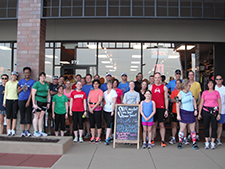Am I a Runner?
On a scale of one to ten—with ten being Meb Kflezighi and one being the guy who makes an annual cameo appearance on the treadmill on January 2nd—what kind of runner are you?
 I’m constantly intrigued by the arbitrary evaluation system employed by runners to assess their place in the sport’s hierarchy. I’m convinced we have an epidemic of personal undervaluation. Age, gender, pace, distance, and experience level don’t really matter: very few runners describe themselves without the use of qualifying words. It’s like there is an unwritten rule that not, only, or just must be used as provisos when describing yourself as a runner.
I’m constantly intrigued by the arbitrary evaluation system employed by runners to assess their place in the sport’s hierarchy. I’m convinced we have an epidemic of personal undervaluation. Age, gender, pace, distance, and experience level don’t really matter: very few runners describe themselves without the use of qualifying words. It’s like there is an unwritten rule that not, only, or just must be used as provisos when describing yourself as a runner.
“Oh, I’m not a serious runner. I only run 5Ks.”
“I’m not fast. I just want to finish.”
“I’ve done a marathon, but only one.”
And, of course, we’re all familiar with the “just the half” caveat.
It’s a strange phenomenon, but runners are constantly trying to convince others that they’re not actually runners. Or at least not good runners. Sure, there is the 0.5 percent of runners who struggle with frequent outbreaks of hubris, but they’re easy to avoid. (Symptoms include verbal diarrhea with a severe case of split times. Often there is an accompanying rash on Facebook ending in ellipses and require a “See more” tab. Never click to see more.) But those are the outliers. Runners are chronically self-deprecating. We have this idea in our heads of what a runner should be (usually a Kenyan), and we are acutely aware of our own perceived shortcomings. Hence the qualifiers.
But if all of us running around town and signing up for 5Ks and training for half marathons aren’t runners, who, may I ask, are?
I started thinking about the definition of a runner after reading an article in The Guardian intriguingly titled, “I Am a Jogger, Not a Runner—And So Are You.” The author, Stuart Heritage, takes offense to being lumped into the running category when he has no desire to be a “runner.” In the article, he makes an honest though somewhat acerbic defense of the term “jogger”:
Runners run because they love running. Joggers jog because they love cake and, to a lesser extent, fitting into their trousers… Because, really, look at yourself. Can what you do really be described as running? Runners vault across the surface of the earth, wind whipping through their hair as they're overwhelmed by the freedom of possibility. That's not us. That's not what we do. We trudge reluctantly from foot to foot, our faces pasted with drool-crust from last night's sleep, cursing ourselves for ever thinking that this was a good idea. The wind has never once whipped through any part of my body during a jog because, if it looks like it's going to be very windy—or rainy, for that matter, or warm—I take off my shoes and go back to bed. For I am a jogger.
First of all, dude, I love cake and fitting into my pants. That’s why I run. That’s why most runners run. (Duh.)
Second, don’t confuse speed with validation. (Runners trudge. Get over it.)
But Stuart’s redemption comes in the final paragraph:
I could happily live my life without ever getting near the peripheries of my comfort zone. You know why? Because I'm a jogger. And, look, so are you. We're not runners… If you're with me, I'll see you in the park. Unless it's windy, obviously. Or warm.
Boom. It may have been an accident, but he nailed it. The definition of a runner—a real runner.
Effort.
Jogging (as Heritage defines it) ends where effort begins. Running is a mindset. Pace doesn’t matter. Neither does distance. There are fast runners. There are slow runners. There are runners who “only” run 5Ks, and there are runners who run “just the half.”  There are runners in front of you and runners behind you, runners who are older than you and runners who are younger than you, runners who are bigger than you and runners who are smaller than you. There are runners who sprint, runners who shuffle, and runners who take walk breaks. There are even runners who jog.
There are runners in front of you and runners behind you, runners who are older than you and runners who are younger than you, runners who are bigger than you and runners who are smaller than you. There are runners who sprint, runners who shuffle, and runners who take walk breaks. There are even runners who jog.
It’s time we stopped belittling ourselves, folks. We’re runners. Let’s own it. Because, let’s face it, if Stuart from The Guardian has the chutzpah to claim his sport, we sure as heck better have enough to claim ours.
Amy L. Marxkors is the author of The Lola Papers: Marathons, Misadventures, and How I Became a Serious Runner. Her second book, Powered By Hope: The Teri Griege Story, will be released in 2014. Click here to receive Amy's weekly article via email.
Connect With Us
See the latest from Fleet Feet St. Louis